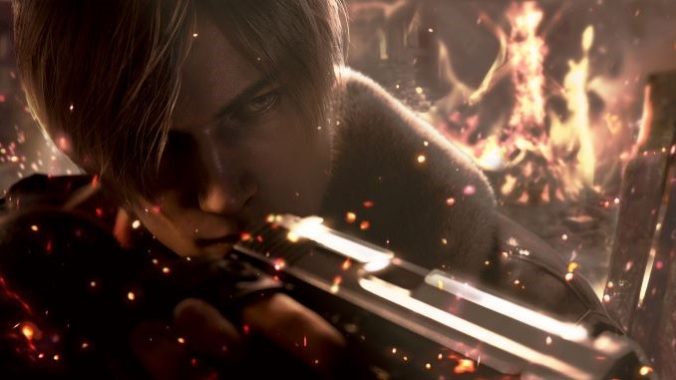Resident Evil 4 Remake Proves That Some Games Are Built To Last

Stop me if you’ve heard this before: Resident Evil 4 is an incredibly good game. I sort of knew this myself, since everyone around me’s shouted a similar sentiment for most of the last two decades. Ever since it landed on the scene, Resident Evil 4 has been literally—and spiritually—everywhere; As of now, the original game has been on just about every console since its release, from the GameCube to the Oculus Quest 2. It even made it onto something called Zeebo, according to Wikipedia. It inspired Dead Space, another legendary survival-horror title, and popularized the over-the-shoulder look that third-person-shooters have employed since. You already know this though, because Resident Evil 4 has been making waves since 2005, and you’ve likely played it multiple times since then.
But I haven’t. Outside of the opening hour of Resident Evil 4, which I’ll controversially admit I didn’t enjoy some years ago, I never experienced the landmark game in its entirety for myself. Then I got the chance to play the remake and I’m happy to say I’ve joined the choir because friends, Resident Evil 4 remains an incredibly good game.
Where do you start when remaking a classic though? For so many, Resident Evil 4 is the quintessential survival-horror game. Though not entirely horrific, it had its fair share of scares and spine-tingling sights that I’m now familiar with. And though I’ve no clue how fans felt at the time about the game’s shift to action, time has proven that it was ultimately the best move. Resident Evil 4 has long been considered an immutable text, and yet at the same time, a large enough contingent of its adorers have clamored for a remake not unlike the one I’ve played through, something that’d necessitate some degree of change to validate its costly existence. The answer, even if it sounds sacrilegious, has been to remix and refine what’s there for a modern crowd.
Beginning with Leon, players now control a more savvy and lithe combatant, like he was in 2019’s Resident Evil 2. He’s still got his signature kicks and all, but he also isn’t suddenly flipping and dodge-rolling around the arena, an actual fear I had. He is sneakier, which allows for way more stealth this time around, expanding on what you can do in the remake. Leon also retains his knife which now has an unobtrusive and very simple parry that is very helpful in a pinch without becoming a spam-to-win kind of deal. Thanks to durability, you can only use the knife—either on downed opponents who are mutating, stealth kills, counters when you or Ashley are grabbed, or as a weapon—a certain amount of times before it breaks, meaning you’ve got to smartly consider when to use it, or load up on smaller knives that’ll take up space in your attache case, a classic survival-horror dilemma that never became a chore to untangle.
And the game truly does feel like the classic survival-horror experience, even if I’ve yet to play the original. While I’ve yet to mention it, the game’s rural Spain setting feels more frightening than ever, thanks in large part due to the advancement and deployment of new lighting techniques. Across the board, the game looks and feels more terrifying than it actually is, which does a lot to set the mood across the entirety of the game. The opening skirmish in the village square escalates at an alarming rate that had me scurrying like my life depended on it. The chainsaw sisters backed me into corners I had to ferociously claw my way out of, and some of the multi-level set pieces in the game’s castle segment (which I’ve at least seen before) are stunning in how much tension they manage to produce while still feeling minimalist. Among the reasons these sequences worked so well for me was their artistic and technical direction, which never squanders the impressive RE engine or forsakes the original design. Along the way here though, the RE4 remake does begin to feel distinctly more ominous than the original and as such, less light-hearted. That part of the game is still intact in much of the writing and scenarios, but begins to feel conspicuously absent as the game marches towards its conclusion. What for some might’ve felt like a steady succession of increasingly ridiculous set pieces and encounters in the original takes on much more weight thanks to the remake’s ambiance and can feel draining. What consistently pushed me despite that feeling was just how intelligently built RE4 is.
-

-

-

-

-

-

-

-

-

-

-

-

-

-

-

-

-

-

-

-

-

-

-

-

-

-

-

-

-

-

-

-

-

-

-

-

-

-

-

-








































